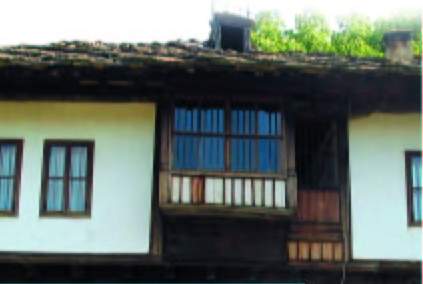 The
name January comes from the Latin word Januarius, i.e. ‘of Janus’,
the month of god Janus. Old people say that the mythical hero and first
king of
The
name January comes from the Latin word Januarius, i.e. ‘of Janus’,
the month of god Janus. Old people say that the mythical hero and first
king of
Latium – Janus, offered a friendly welcome to the god of agriculture
Saturn, who had been expelled from Heaven. In return Saturn taught the
citizens of Latium how to cultivate their land and gave Janus the ability
to see both the past and the future. This is the origin of the phrase
“double-faced Janus”. Janus is depicted as a man with two
faces – the one looks into the past and the other looks into the
future.
1 January SOURVA (Vasilyovden, St. Basil’s Day)
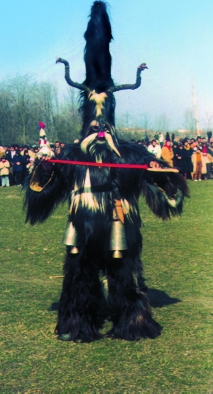 Bulgarians
also call the New Year’s Day with the names “Souroka”,
“Vassilitza” or “Sourozdru”. On the eve of the
holiday the family gathers round the table, which is piled with various
dishes, everything that the family wishes to have during the year. The
woman of the house smokes four grains of incense over the ploughshare
and with circular motions from left to right she smokes the whole table.
Then she turns three times the pan with the cake (banitsa) in which she
has put "kismets" made with cornel-tree buds and a silver coin.
Each member of the family is quick to take his piece in order to see his
luck for the year. On the morning, very early, the children go from house
to house and tap everybody on the back with decorated cornel twigs pronouncing
the blessing: Sourva, sourva the year, a merry prosperous year!
Bulgarians
also call the New Year’s Day with the names “Souroka”,
“Vassilitza” or “Sourozdru”. On the eve of the
holiday the family gathers round the table, which is piled with various
dishes, everything that the family wishes to have during the year. The
woman of the house smokes four grains of incense over the ploughshare
and with circular motions from left to right she smokes the whole table.
Then she turns three times the pan with the cake (banitsa) in which she
has put "kismets" made with cornel-tree buds and a silver coin.
Each member of the family is quick to take his piece in order to see his
luck for the year. On the morning, very early, the children go from house
to house and tap everybody on the back with decorated cornel twigs pronouncing
the blessing: Sourva, sourva the year, a merry prosperous year!
Big wheat in the fields, red apples in the orchard, Yellow corncobs, large
grapes on the vine, The hives filled with honey, small chickens
everywhere! May you be alive and healthy this year and forever!
The traditional concept of the New Year sourva-twigs has always been connected
with their decoration and their ritual function related to mythological
culture. The myth presents the sourva-twig as a form of the
Tree of the World, and the boys as mediators between the worlds that predetermine
future prosperity. The sourva-twigs in Bulgaria are of two types: “cut”
and “tied”. The “cut” ones can be “brides”
or “perashki”,
while the “tied” ones are made of rich cornel twigs decorated
with multicolored woolen threads, popcorn, dried fruits, hot peppers,
seeds, raisins, and colored papers.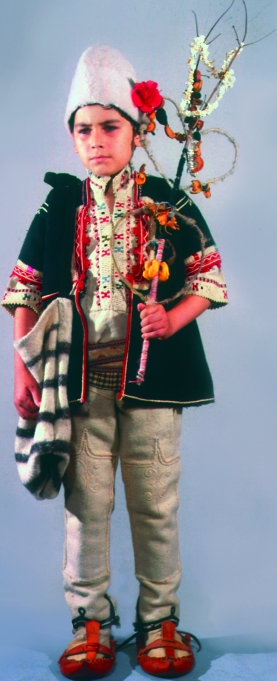 These decorated sourva-twigs are known in folk terminology as “painted”,
“motley”, “variegated”, “done” and
“ornamented”. But the content of all these terms is one and
the same, for people do not make a great difference between one type or
another. After the sourva ritual, toward evening, the houses are visited
by young men disguised in a “camel” or “djamalo”
to wish the hosts health and fertility during the coming year. The djamalo
driver pronounces the blessing: Where the djamalo sets foot may there
be joy and prosperity! May people be as strong as my mace! May children
be as many as the bees in the hive! Then the djamalo “dies”
symbolically, so that evil in the house also dies, and comes to life again,
as nature wakes again to give more prosperity to the people. In return
for their performance – verbal and imitative magic, the young men
receive food, money and a good treat. In Tavria (Zaporozhie region, Ukraine),
on the Old New Year, as Bulgarians there call this day, young men visit
the houses till late at night, disguised or simply made up with black
paint on their faces, and bless every living being by touching them, which
brings health and fertility.
These decorated sourva-twigs are known in folk terminology as “painted”,
“motley”, “variegated”, “done” and
“ornamented”. But the content of all these terms is one and
the same, for people do not make a great difference between one type or
another. After the sourva ritual, toward evening, the houses are visited
by young men disguised in a “camel” or “djamalo”
to wish the hosts health and fertility during the coming year. The djamalo
driver pronounces the blessing: Where the djamalo sets foot may there
be joy and prosperity! May people be as strong as my mace! May children
be as many as the bees in the hive! Then the djamalo “dies”
symbolically, so that evil in the house also dies, and comes to life again,
as nature wakes again to give more prosperity to the people. In return
for their performance – verbal and imitative magic, the young men
receive food, money and a good treat. In Tavria (Zaporozhie region, Ukraine),
on the Old New Year, as Bulgarians there call this day, young men visit
the houses till late at night, disguised or simply made up with black
paint on their faces, and bless every living being by touching them, which
brings health and fertility.
This is the nameday of Vasil, Vasilka, Veselin, Vasko, etc. The name Basil
is of Greek origin and means ‘regal’.

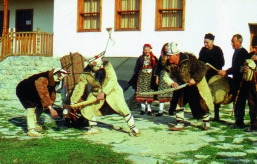
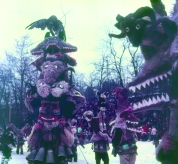
2 January MOUKOVDEN (Karamanovden, St. Sylvester)
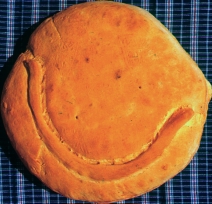 In
some villages it is also called “Rinachov”. On the evening
In
some villages it is also called “Rinachov”. On the evening
before Moukovden young men go to “propose” to the young
lasses. Not to visit but to demonstrate that they are capable of keeping
house. They enter the stable and shovel out the garbage. The hosts leave
hanging on a nail behind the
door a bag full of food – sausage, bacon and a bottle of wine as
a treat. The young woman secretly puts in a branch of box-tree for her
beloved, tied with a bright red thread and wrapped in a multi-colored
cloth, a sign that she is waiting for the matchmakers to come.
Owe to those who forget to give them the treat. Very often in the morning
they find the stables overflowing
with dung brought over from the neighboring houses. Their daughter turns
into a laughing stock at the
horo dance for “the boys have shovelled her stables”. Such
a girl is considered to be “stuck” and it is difficult for
her to find a marriage partner. This is the nameday of Silvia, and silva
means ‘forest’ – strength and freshness.
4 January. Nameday of Tihomir (silent).
(Yordanovden, St. Jordan’s Day, Epiphany)
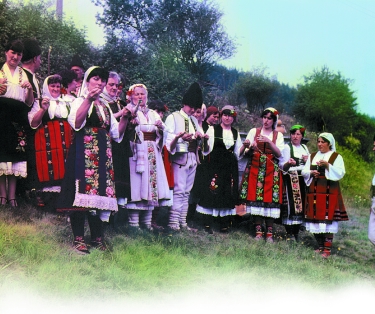 will
give him health for the whole year. In
will
give him health for the whole year. In
every home there is a ritual table, which is
smoked with incense to mark the end of
the "dirty" (poganni) days and drive the evil
forces away.
Nameday of Yonko, Yonka, Yoto,
Yordan, Yordanka – after the name of the
Palestine river Jordan, Bogomil (‘dear to
God’) and Bogdan (‘given by God’).
In some regions the holiday is called
“Vodokrushti” or “Priest’s Christmas”. It
is
connected with the faith in the purifying,
healing and magic power of water.
After church service in the morning,
water is solemnly blessed with cross and
prayer. The priest throws a wooden cross
into a river, lake or sea and young men
jump into the icy cold water to take it out.
Whoever reaches the cross first and brings
it back to the priest receives money and
blessing from him. People believe that God.
7 January IVANOVDEN (The Day of St. John the Baptist)
In many places, on the evening before Ivanovden, “after the water
is blessed”, men perform the rite of swearing brotherhood, also
called “Ivanovstvo” or “Aratlichestvo”. This is
a ritual involving two or three men. They step with bare right foot on
glowing embers in order to be strong and to care for each other. Then
the sorcerer gives them to drink three times from a vessel of red wine
– a symbol of blood, which connects them forever. Tied with one
red belt the men break three ritual breads to link forever three families
in a holy union. Then the newly established brotherhood is strengthened
with three consecutive dances – “chepnya”, performed
by the women, “black pepper” – performed by the men
of the three families, and “dumb horo” – danced by all.
In this way the three men unite their three families and
become brothers. Their wives become sisters. Traditionally on this day
people celebrating their nameday (Ivan, Ivanka, Ivaylo, Vanyo, Vanya),
the newly married and children are bathed for health and ritual bonding
with the family. It is believed that the water on this day has apart from
purifying a consecration
power, as this is the day of brotherhood. In some villages they bathe
the sonsin- law. An important element of the holiday rituals are the nameday
visits. The name Ivan comes from the Old Greek Joanes, which
means ‘God’s blessing’ or ‘God helps’.
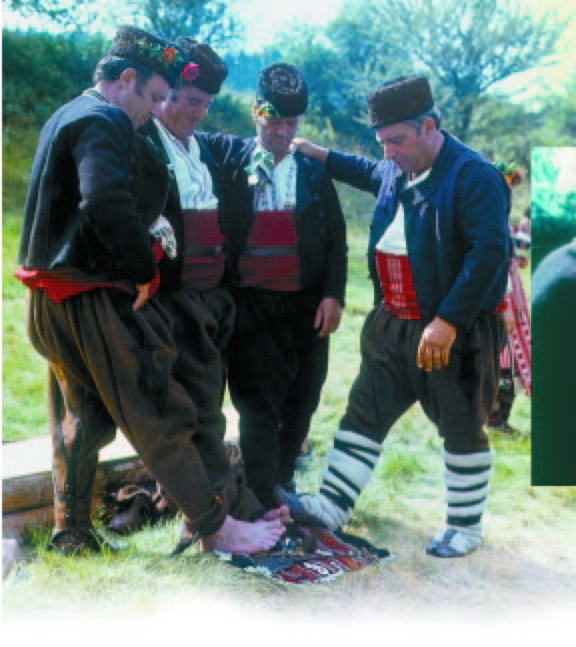
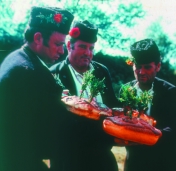
8 January BABINDEN (Midwives’ Day)
Midwives’ day, my dear, Midwives’ day,
Why is it not every day!"
(folk song)
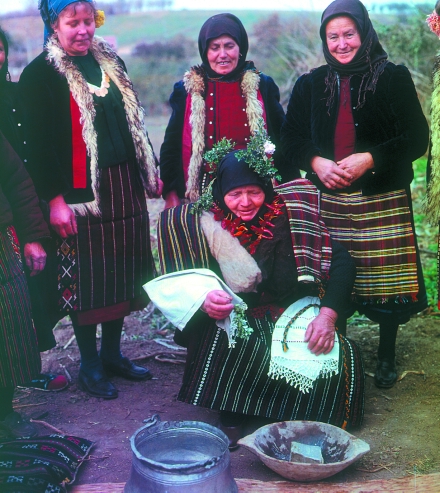
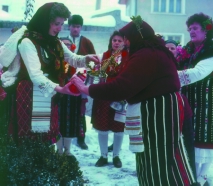
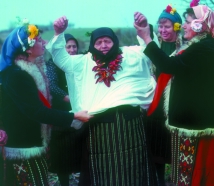
When Ivanovden is over, next comes Midwives’ Day. On this day women
get up early so that their children will be early risers, and make fresh
bread. The young women who have given birth during the year expect the
midwife to visit their house. In Thrace the midwife visits in the morning
every house in which she helped in childbirth. She sits by the child,
spins red wool, twists the thread and ties it on the child’s right
hand “for health and against evil eyes”. Then she washes the
eyes of the child with fresh water, spreads butter and honey on its forehead,
sticks on it a fibril of the red wool and pronounces a blessing. When
the young mother pours water for her to wash her hands, the midwife dries
her hands in the
mother’s skirt so that the latter gives birth to her next children
easily. Every mother gives as a present a silver coin and a tuft of wool.
The women who have given birth for the first time bake a loaf of bread
for the midwife with a hole in the middle through which they pass a linen
shirt, an apron and multi-colored woolen socks. The true festivity begins
at noon when all women, with motley bundles on their shoulders, enter
the house of the midwife with laughter and songs. Before the feast the
midwife smokes the table with incense and blesses: “May those who
have given birth
this year repeat it next year. May the full become empty and the empty
become full. Amen!” The women scoop the healing smoke toward themselves
to become pregnant the next year and give birth with ease. The midwife
breaks the bread and gives a piece to each woman divining what child she
will have – crust for a boy and the middle for a girl. Songs, jokes,
dances and a ritual bathing of the midwife follow.
On this day men keep quiet for if they catch a glimpse of the ritual this
will make the women angry. And the punishment is to fill their pants with
stones.
12 January. Nameday of Tatiana, Tanya (from the Latin ‘she who arranges’).
14 January. Nameday of Nina (from the Greek Ivanina).
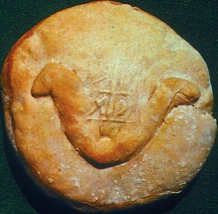 17
January ANTONOVDEN
17
January ANTONOVDEN
(St. Anthony’s Day)
People celebrate this day and don’t work as protection against the plague. Young brides get up at dawn and bake breads called “choumini” (of the plague). They spread honey on them and give them out to the neighbors for the health of people and animals. To keep the plague away on this day you must not cook beans, lentils, corn, you must not sew or knit. The nameday of Anton, Antonia, Doncho, Donka, all derived from the Latin Antonius meaning ‘priceless’.
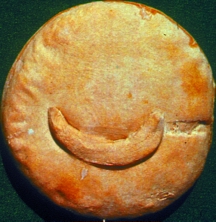 18
January ATANASOVDEN
18
January ATANASOVDEN
(St. Athanasius’ Day)
A legend from Thrace says that on St. Athanasius’ Day winter is
going away because the saint puts on his silk shirt, climbs up a high
hill and cries: “Go away, Winter, let Summer come!” On this
day, at dawn, people pick snowdrops and hellebore and the sun, on seeing
the people, gives them health and longevity. Ritual bread is baked in
every house and is covered with honey. A black hen is slaughtered and
offered to the plague so that people and animals do not die. The feathers
are kept by the housewife for protecting the children from bad luck and
strange diseases. Bulgarians in Bessarabia pay homage to
Saint Tanas as a patron of blacksmiths. In pagan mythology he is the heavenly
blacksmith- sun, who puts his bare hands into the burning furnace and
takes out the red-hot iron. The name Atanas comes from the Old Greek Athanasios,
meaning ‘immortal’. 20 January. Nameday of Evtim. The name
originates from the Sanskrit en, which designates eternity, the hidden
God. Some interpret the name as meaning ‘kindliness’.
25 January. Nameday of Grigor, which means ‘be on the alert, stay
awake’. 31 January Sredzimie (Midwinter) This holiday is a remnant
of the oldest Indo-European New Year. For the Bulgarians
this is the day of shepherds, cowherds, swineherds and horse-keepers.
People pick “brustina” (“karagach’”, “ilem”)
– dry leaves of elm-tree for the sheep.